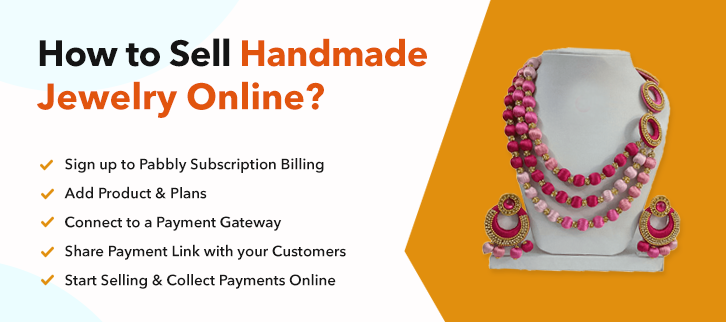Navigating the Legal Landscape: A Comprehensive Guide to Selling Handmade Jewelry
Related Articles: Navigating the Legal Landscape: A Comprehensive Guide to Selling Handmade Jewelry
Introduction
With enthusiasm, let’s navigate through the intriguing topic related to Navigating the Legal Landscape: A Comprehensive Guide to Selling Handmade Jewelry. Let’s weave interesting information and offer fresh perspectives to the readers.
Table of Content
Navigating the Legal Landscape: A Comprehensive Guide to Selling Handmade Jewelry

The allure of handcrafted jewelry, with its unique designs and personal touch, has captivated consumers for centuries. In today’s digital age, the opportunity to sell handmade jewelry online has become increasingly accessible. However, navigating the legal intricacies of this endeavor is crucial to ensure a smooth and successful journey. This comprehensive guide provides a detailed understanding of the laws governing the sale of handmade jewelry, equipping aspiring and established creators with the knowledge to operate legally and ethically.
Understanding the Legal Framework
The legal landscape surrounding handmade jewelry sales is multifaceted, encompassing a variety of regulations at both the federal and state levels. These regulations are designed to protect consumers, ensure fair competition, and promote ethical business practices.
1. Federal Regulations:
- Copyright Law: The Copyright Act of 1976 grants automatic copyright protection to original works of authorship, including jewelry designs. This protection prevents unauthorized reproduction, distribution, and display of the design. While copyright protection does not cover functional aspects of the jewelry, it safeguards the artistic expression embodied in the design.
- Trademark Law: If a jewelry maker uses a unique brand name, logo, or design element that distinguishes their products, they may be eligible for trademark protection. This protection prevents others from using the mark in a way that could cause confusion among consumers.
- Consumer Product Safety Commission (CPSC): The CPSC sets safety standards for consumer products, including jewelry. Jewelry makers must comply with these standards to ensure their products are safe for consumers. This includes regulations regarding lead content, nickel content, and other potentially harmful materials.
- Federal Trade Commission (FTC): The FTC regulates advertising and marketing practices, including those related to jewelry sales. This includes regulations regarding truth in advertising, product claims, and the use of endorsements.
2. State Regulations:
- Sales Tax: Most states require businesses to collect and remit sales tax on their sales. The specific regulations vary by state, including the tax rate and the types of jewelry that are subject to sales tax.
- Business Licensing: Many states require businesses to obtain a license to operate. The specific requirements vary by state, but may include a general business license, a sales tax permit, and a home occupation permit.
- Consumer Protection Laws: States have consumer protection laws that protect consumers from unfair or deceptive business practices. These laws may cover issues such as product warranties, return policies, and product safety.
Key Legal Considerations for Handmade Jewelry Sellers:
1. Product Safety and Labeling:
- Material Disclosure: Jewelry makers must accurately disclose the materials used in their products, including any potential allergens or irritants. This information should be clearly presented on product descriptions, packaging, or accompanying documentation.
- Lead and Nickel Content: Regulations regarding lead and nickel content in jewelry vary by country and state. Jewelry makers must ensure their products comply with the relevant standards to avoid potential health risks to consumers.
- Safety Standards: Jewelry makers should comply with all applicable safety standards for the materials used in their products. This may involve using certified materials, conducting safety testing, and obtaining necessary certifications.
2. Intellectual Property Protection:
- Copyright Registration: While copyright protection arises automatically upon creation, registering the copyright with the U.S. Copyright Office provides additional legal benefits, including the ability to sue for infringement and the presumption of ownership in court.
- Trademark Registration: Registering a trademark with the U.S. Patent and Trademark Office provides nationwide protection and legal recourse against infringement.
- Design Patents: In some cases, a jewelry design may be eligible for design patent protection. This type of patent protects the unique and ornamental features of the design, providing exclusive rights for a limited period.
3. Business Structure and Licensing:
- Sole Proprietorship: This simple structure allows individuals to operate a business under their own name. However, the owner is personally liable for all business debts and obligations.
- Partnership: Two or more individuals agree to share in the profits and losses of a business. Like sole proprietorships, partners are typically personally liable for business obligations.
- Limited Liability Company (LLC): An LLC provides limited liability protection to its owners (members), meaning they are not personally responsible for business debts.
- Corporation: A corporation is a separate legal entity from its owners (shareholders). This structure offers limited liability protection and tax advantages, but also involves more complex administrative requirements.
- Business Licenses: Depending on the location and type of business, jewelry makers may need to obtain various licenses and permits, including a general business license, a sales tax permit, and a home occupation permit.
4. Online Sales and E-commerce:
- Website and Online Store: Jewelry makers selling online must comply with applicable laws and regulations regarding website content, privacy, and data security.
- Payment Processing: Choosing a reputable payment processor is crucial for online sales. Ensure the chosen processor complies with relevant security standards and data protection laws.
- Shipping and Delivery: Jewelry makers must comply with shipping and delivery regulations, including labeling requirements, insurance, and customs regulations for international shipments.
5. Advertising and Marketing:
- Truth in Advertising: Jewelry makers must ensure their advertising and marketing materials are truthful and accurate, avoiding misleading claims or deceptive practices.
- Product Claims: Any claims made about the properties or benefits of jewelry must be supported by evidence and comply with FTC regulations.
- Endorsements: If using endorsements or testimonials, jewelry makers must ensure they comply with FTC guidelines, including disclosure requirements for paid endorsements.
6. Consumer Protection and Returns:
- Return Policies: Jewelry makers should have clear and fair return policies that comply with applicable consumer protection laws.
- Warranties: Jewelry makers may offer warranties on their products, which must be clearly stated and comply with relevant regulations.
- Product Liability: Jewelry makers are responsible for any defects or hazards in their products that cause injury or damage to consumers.
7. International Sales:
- Customs Regulations: Jewelry makers selling internationally must comply with the customs regulations of the destination country. This includes labeling requirements, import duties, and other regulations.
- International Intellectual Property Protection: Jewelry makers selling internationally should research the intellectual property laws of the destination country to protect their designs and trademarks.
FAQs on Selling Handmade Jewelry:
Q: Do I need a license to sell handmade jewelry?
A: The licensing requirements vary by state and locality. It is recommended to consult with your local government to determine the specific requirements for your business.
Q: Do I need to pay sales tax on my handmade jewelry sales?
A: Most states require businesses to collect and remit sales tax on their sales, including sales of handmade jewelry. The specific regulations vary by state, so it is essential to research the requirements in your state.
Q: What materials can I use in my handmade jewelry?
A: The materials used in jewelry are subject to various regulations, including those related to lead content, nickel content, and other potential allergens. Jewelry makers should research and comply with all applicable safety standards.
Q: How do I protect my jewelry designs from being copied?
A: You can protect your jewelry designs through copyright registration, trademark registration, or design patents. The best approach depends on the specific design and your business goals.
Q: What are the legal requirements for selling handmade jewelry online?
A: Online sellers of handmade jewelry must comply with various laws and regulations, including those related to website content, privacy, data security, payment processing, shipping, and advertising.
Q: What should I do if someone is selling a copy of my jewelry design?
A: If you believe someone is infringing on your intellectual property rights, you should consult with an attorney to discuss your options for legal recourse.
Tips for Selling Handmade Jewelry Legally and Ethically:
- Research and Understand the Law: Stay informed about the relevant laws and regulations governing your business.
- Comply with Safety Standards: Ensure your products meet all applicable safety standards, including those related to materials, labeling, and packaging.
- Protect Your Intellectual Property: Consider registering your trademarks and copyrights to protect your designs.
- Obtain Necessary Licenses and Permits: Ensure you have all the necessary licenses and permits to operate your business legally.
- Maintain Transparent and Fair Business Practices: Be honest and transparent with your customers about your products, pricing, and policies.
- Provide Excellent Customer Service: Build strong relationships with your customers by providing timely and helpful support.
- Keep Records and Documentation: Maintain accurate records of your sales, expenses, and other business activities.
- Seek Professional Advice: Consult with an attorney or accountant for legal and financial guidance.
Conclusion:
Selling handmade jewelry is a rewarding and fulfilling endeavor, but it requires a clear understanding of the legal landscape. By adhering to the laws and regulations outlined in this guide, jewelry makers can establish a sustainable and successful business. Remember, compliance with legal requirements not only protects consumers but also ensures the long-term success and reputation of the handmade jewelry industry.







Closure
Thus, we hope this article has provided valuable insights into Navigating the Legal Landscape: A Comprehensive Guide to Selling Handmade Jewelry. We appreciate your attention to our article. See you in our next article!